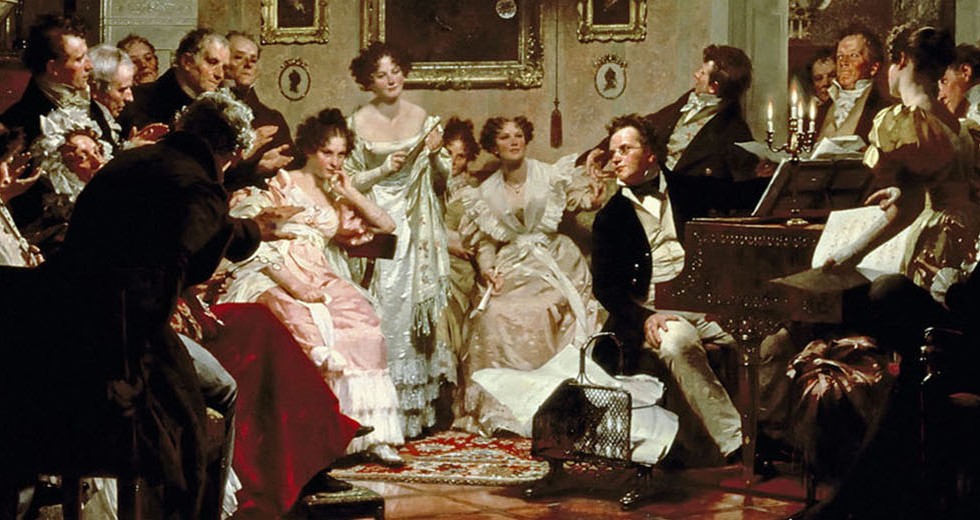
The Chicago Symphony Orchestra played music by Franz Schubert in its very first year, and his works have always remained at the heart of the CSO’s music life — his name is even engraved over one of Orchestra Hall’s five Michigan Avenue doors. But never before have the CSO and visiting artists focused so much attention on this composer — at once so beloved and yet so little known — as this season. The heart of this Schubert feast is the Chicago Symphony Orchestra’s complete symphony cycle, with music director Riccardo Muti conducting. The CSO has never before played all eight of Schubert’s symphonies in a single season. (Although there are nine numbered symphonies, Schubert fully sketched No. 7 but only orchestrated the very beginning, so it is unperformable as it stands.)
Schubert’s symphonic output is one of music’s most delicate miracles. These symphonies are so intimate and refined that orchestras — and conductors — often pass them by for works of greater spectacle and more easily won success. “With Schubert, you have to know that you are playing for the music,” Muti says, “not for the standing ovation of the public.”
The payoff, for the audience and the musicians themselves is, of course, incomparable. This is music of abundant satisfaction: it coaxes players to listen to one another as if they were playing chamber music and to sing with their instruments; it gives audiences a rare sense of inner pleasure, of well-being. Behind the polished veneer of the scores, you sense that Schubert, as one of his friends once said, was reaching for the stars. “When you hear the music of Schubert, you go home enriched,” Muti says.
Although both the Eighth and Ninth symphonies (the Unfinished and the Great C Major) have been anchors of the CSO’s repertoire since its first year, several of Schubert’s early symphonies are nearly unknown to Chicago audiences. The CSO has played the First only once, in 1982, and the Second has not been performed here in nearly four decades. But the real revelation this season may well be the Mass in A-Flat Major, which the CSO and Chorus will perform for the first time in February. “In this mass, Schubert never becomes tragic,” Muti says, comparing it to the Florentine frescoes of the same period: “At the death of Christ, the mother always has a light, sweet — dolce — smile. It is never terrifying; it is like the door to another world.”
RELATED: John von Rhein on the CSO’s Schubert salute, in the Chicago Tribune:
There is more music by Schubert in Orchestra Hall this season, including three rare evenings of song: modern, concert-hall version of the celebrated Schubertiades of the composer’s own day, when friends gathered in Viennese homes to hear what extraordinary things Schubert had recently written. The programming begins with the two iconic song cycles, among the most powerful narratives in all music: Winterreise on Dec. 4, with baritone Christian Gerhaher, accompanied by pianist Gerold Huber (this recital was canceled due to illness), and Die schöne Müllerin on Jan. 19, sung by Matthias Goerne, with Christoph Eschenbach at the piano. Then in May, soprano Susanna Phillips and bass-baritone Eric Owens will join musical friends in a sampling of Schubert’s most glorious songs, including the virtuoso showpieces Der Hirt auf dem Felsen (“The Shepherd on the Rock”) and Auf dem Strom (“On the River”).
Schubert himself was a fine pianist, and his sonatas have slowly come to be acknowledged as important works no less pioneering in their own idiosyncratic way than Beethoven’s. Evgeny Kissin plays the D Major Sonata (D. 850) on March 2, Mitsuko Uchida the G Major Sonata (D. 894) in recital March 9, and Vladimir Feltsman turns to the early sonata in A minor (D. 537) on June 1. In April, violinist Pinchas Zukerman and pianist Yefim Bronfman will perform the A minor violin sonatina (D. 385) and the glorious Piano Trio in B-flat gets not one, but two performances on the CSO’s Chamber Music Series. And the great Trout piano quintet, as much loved as any work in the Schubert catalog, is the central piece of Uchida’s own CSO concert in March, where, in this delectable work of chamber music, she will share the stage with members of our orchestra.
In its range of music — solo to orchestral, song to symphony, works written for the church and for the home — this season offers an extraordinary journey that promises to take listeners closer than ever to the heart of Schubert’s achievement. “Through the symphonies and the other music of Schubert,” Muti says, “I think that the public will be able to understand one of the most beautiful and tragic personalities in the world of music.”
Phillip Huscher is the program annotator for the Chicago Symphony Orchestra.
PHOTO: Julius Schmid’s 1897 painting of a Schubertiade.